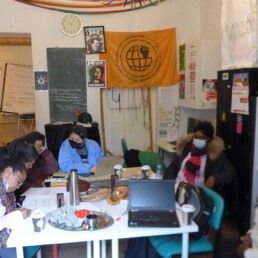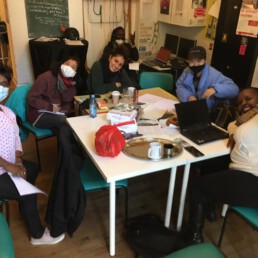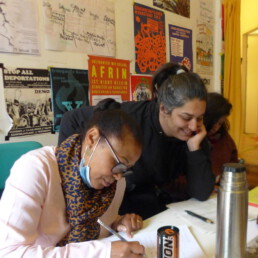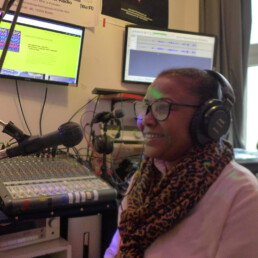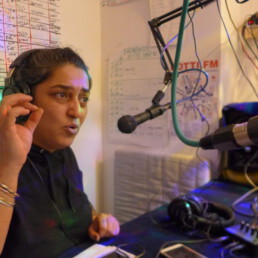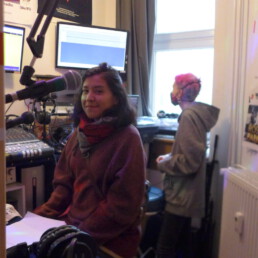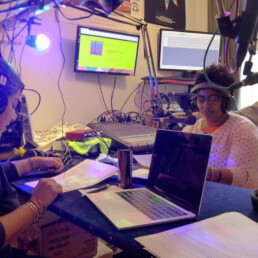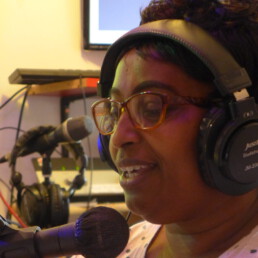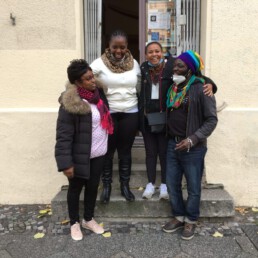Lavenda, Shokoofeh, Shadia, Nujiyan, and Xalteva from the Alliance of Internationalist Feminists Berlin come together for this special IWS RADIO episode ahead of the 25th of November – the International Day for the Elimination of Violence against Women. They discuss the violences women face created by a history of colonialism, imperialism, capitalism, and white supremacy – and how women are organising against these oppressions in their own contexts and through transnational alliances. All over the world, women are getting organised and calling all women to be a part of this internationalist fight.
You can find IWS RADIO on the following platforms... Apple Podcasts, Castbox, Castro, Deezer, Google Podcasts, iHeartRadio, Overcast, PlayerFM, Podcast Addict, Podcast Republic, Podchaser, RadioPublic, SoundCloud, Spotify, Stitcher, TuneIn...
What do you think of IWS RADIO? We would like to hear from you, our listeners: What have we got right? What have we got wrong? What could we do differently in the future? >>> Click here to fill out our little survey and tell us what you think!
Links
Music
Transcript & translation
LAVENDA
Hello everybody. I am Lavenda from the Break Isolation Group, which is a project of International Women* Space (IWS), and we are here at We Are Born Free radio for the 8th episode.
I want to introduce our companheira, Shokoofeh, who is from IWS and the Alliance of Internationalist Feminists, who will be here to talk with our guests. I will be one of the guests later on in the episode where I will share more about the Break Isolation Group (BIG) and the organizing of refugee women. So allow me to welcome, Shokoofeh.
SHOKOOFEH
Thank you, Lavenda. Hi, I’m Shokoofeh. We have in the studio today not only Lavenda from the Break Isolation Group, but also Shadia from SudanUprising, Xalteva from the Asamblea de Mujeres from the Bloque Latinoamericano, and Nujiyan from Ezidischer Frauenrat, Êzîdî Women Council. We will also get to hear audio call outs from the AG Trostfrauen, Women in Exile, and the Alliance of Internationalist Feminists Berlin.
For today’s show, we want to focus on violence against women because the 25th of November is around the corner, and the 25th of November is the International Day for the Elimination of the Violence Against Women.
But what are we really talking about when we talk about violence? We know of the domestic violence that is often in the media. But as internationalist women, or as an internationalist feminist Alliance, we feel it is important to add to this discussion, the violence that the woman face created by the history of colonialism, imperialism, capitalism, white supremacy, and also the violence in political struggle.
We want to also discuss how women are organizing against these oppressions in their own context and through international alliances. The 25th of November is a day to call women to be part of this internationalist fight. Before we talk with our guests about their struggles and resistance, let’s first hear from the Asamblea de Mujeres from the Bloque Latinoamericano to know more about this day
[AUDIO: Asamblea de Mujeres on the 25th of November]
“If they kill me, I will take my arms out of the grave and be stronger”
With these words, Dominican activist Minerva Mirabal responded in the early 1960s to all those who warned her of what seems to be a secret known to all: the redeemed president Rafael Leónidas Trujillo will kill her. Then on November 25th, her body was found at the bottom of a ravine inside a Jeep with two of her sisters, Patricia and María Teresa, and the driver of the car.
This month, we recognize the International Day of the Elimination of Violence against Women and feminized bodies. Violence against women, girls, and feminized bodies is one of the most whispered, persistent, and devastating human rights violacions in our world today. It remains largely unreported due to the impunity, silence, stigma of shame surrounding it.
For that reason, today, we want to share the story of the Mirabal sisters: three brave women, who followed their convictions and fought for justice against dictatorship in their country. Known as Las Mariposas – the butterflies – the Mirabal sisters were born in the Dominican province of Salcedo. At the time of their death, they had ten years of political activism in the Trujillo dictatorship. Two of them, Minerva and María Teresa, had already been imprisoned several times due to their actions as activists.
They started an activist group called, “The movement of the 14th of June”, named after the date the country and patria witnessed a massacre ordered by Trujillo, the president of the Dominican Republic at the time. Their group’s primary goal was to oppose Trujillo’s regime. They informed the public about Trujillo’s crimes and openly spoke about the injustices committed under his ruling. On the 25th of November in the 60s, some hitmen following the orders of Trujillo, killed them savagely and brutally. In 1999, the United Nations General Assembly declared November 25th to the International Day of the Elimination of Violence against Women in honor of the Mirabal sisters and their fight for justice.
Today, we are inspired by these sisters, by their courage and their refusal to stop fighting for what they believed in. The Mirabal sisters have paved the way for many more women* to become activists. Let us hope that today will serve as a reminder that violence against women* will speak out, will not make other women quiet.
SHOKOOFEH
Thank you very much for this input comrades from the Asamblea de Mujeres.
So, we would like to start now with Shadia from SudanUprising. She is a feminist and communist activist and a civil society member from the Sudan now living in Berlin, and also a member of SudanUprising Germany. Since the beginning of the Sudanese revolution in 2018, a group was formed internationally named SudanUprising. Also in Germany, they are very active.
What I think is so important about Sudanese revolution is how women were not only taking spaces in the revolution – but leading it. And this is a part of a very long history of Sudanese women activists fighting against colonialism, patriarchy, and the dictatorship in Sudan. Welcome Shadia, it’s great to have you here.
SHADIA
Thank you for this opportunity. I’m happy to meet you.
SHOKOOFEH
Shadia, the image that the Sudanese revolution showed to the world was women leading a revolution. And that brought a lot of hope to a lot of us in the movement. So what’s going on now, how is it going?
SHADIA
Really it is sad, but I will talk about the very happy part of this. Sudanese women really have a very deep, long fight against dictatorship, patriarchy, and oppression. So their participation in the revolution started very strongly in the beginning of this dictator regime – like 30 years ago – so that women could be very organized during the revolution because they are prepared. Really, they started the revolution 30 years ago, and they lead the movement in the street and give us all the hopes that we didn’t pay 30 years for nothing.
There’s that part of the thing that the transition government and the political coalition just ignore women completely during the organizing of the government and during the period of the preparation to the next day. So they ignored women during the negotiations, even though the majority of us women do not agree to negotiate with the military part. But after that, this ignoring continues in every part of the preparation of the transition period. And even when they include women, the men or the male in his political coalition and in the government, they choose women from their point of view. And this is very sad really.
SHOKOOFEH
What do you mean with their point of view?
SHADIA
They select women who they know or who they think are good. They didn’t give the women movements a chance to know who can participate. Also, even the seats in the government, very few leading seats for women. The government, they bring only two ministers. And from our point of view, we don’t know them in the women’s movement, so that we are not very sure that they can fight for our issues as women.
Also, only two women in the Supreme Council, so something just, like, “we include women, women are with us”. And also, they are talking about something very annoying. They are saying that representing women. Why should we be represented when we are ruling? What they did to have this opportunity – to have this right?
SHOKOOFEH
What is the strategy of women’s movement due to the current situation now?
SHADIA
Actually, I feel that we are working as women’s movement with the same strategy from the beginning, from the time of fighting against colonialism. And every time when there is big change in Sudan, we get back to the start because when we change regime and after every evolution or any, every political change, we find ourselves that we have to fight for our rights as women. And this is the starting point all the time – we find ourselves in this starting point.
So I think that now, we are thinking during this revolution with the same strategy, which is leading to no point. We have to change our strategy and really this is my very important issue and question: what will we do, how we can do it, to change the result, because it is nonsense to do the same things and wait for different results. We have to change to get different results – to find a way to be part of the decision making.
I just wanted to add that the violence – the ignoring of women from the transition authorities after the revolution – means that they are keeping silent about every kind of violence which is happening to women, starting from the legislations, which is completely against women. All kinds of violence: domestic violence and Constitutional violence. This is what is what I mean when I talk about ignoring women is a very harmful kind of violence against women. Thank you.
SHOKOOFEH
The other amazing part of the Sudanese revolution for a lot of us was how you all connected internationally during and after the revolution. How was your experiences of these alliances? Did it help and how you are continuing to work in this form?
SHADIA
A lot, a lot, really. I should thank all the colleagues and comrades from different parts of the world and especially here in Germany, who gave us a chance from early 2018 when the Sudanese Communist Party in Sudan wanted to walk, to organize a demonstration, to talk to the government as the last regime about national budget. They give us chances and make different kinds of interviews with me, especially, and I get a chance to speak about how the European Union defends the government as a dictatorship in Sudan, how they are paying the Janjaweed, which is now part of the transition period by just taking the Sudanese revolution.
And I guess we talk about the revolution as a movement of Sudan and this is helpful. And also, they supported us – they stand with us at the demonstrations and during the revolution. This gives us a chance to let all the world know about the Sudanese revolution. Because once the revolution started really hard and there were people in the streets, nobody talked about them. The official media all over the world, just ignore what’s happening in Sudan, although hundreds of Sudanese people were dying every day, being shot down in the streets. I think this support and solidarity let the world listen and hear what is happening in Sudan, and what was happening in Sudan. I really thank all the people who stand with us.
SHOKOOFEH
Especially in Berlin, you’re also very good connected as a working group woman in the SudanUprising. How is this work for you? I mean, the feminists work inside your struggle, inside your fight.
SHADIA
Yeah, this is working very, very good for us and gives us the hope and the feelings to go forward. And they just support us all the time, even sometimes we feel very disappointed and feel very weak, after we see the result of the political situation in Sudan now after the revolution. Our comrades in this alliance, by giving us very, very strong support and helping us – this opportunity just to talk about violence against women, to talk about the Sudanese women movement – I think this is very nice or a very good kind of support. And thank you for this.
SHOKOOFEH
Thank you for being here and thank you for your input. You chose also a song for us: Azza Fee Hawak from Khalil Farh. Would you tell us a bit more about this song?
SHADIA
Yes, this song, it is a very old Sudanese song. Khalil Farh is the musician who make this song. He tried to motivate women to get up and stand against colonialism and for their rights and so on. And he just talks to a lady called Azza. She’s the wife of one of the parties in Sudan at that time. And now she is a symbol of the Sudanese and you can find so many Sudanese young ladies called Azza.
The song is telling the women to get up, stand for their rights and telling them that while you are sleeping and doing the hard house work: take care of your body, beauty, and so on. The women all over the world are just working and as they are heading off, you saw, this song is very motivating. And personally I like this song. This is my input.
SHOKOOFEH
Thank you very, very much, Shadia for your input. Let’s listen to the song.
SHADIA
And this song is from Khalil Farh initially and it is now by the choir of the Institute of Music in Sudan and I like it.
[SONG: Khalil Farh – Azza Fee Hawak]
SHOKOOFEH
Now we are back. We have heard now the experiences of women from SudanUprising and the Asamblea de Mujeres from the Bloque Latinoamericano.
Today, we also have Nujiyan with us by phone. She is a member of the Kurdish Women Movement and from the Ezidischer Frauenrat, the Yazidi Women Council in Berlin, which was founded after August 3rd 2014, the date of the femicide that happened in the Yazidi area called Shengal.
The Yazidi society right now is very worried about the agreements between Baghdad and the Iraqi government and the Kurdish regional government in Iraq, which tries to decide for the lives of the Yazidi people without them. Behind this shame are the USA and Turkey.
Nujiyan, can you tell us more about the situation and your ongoing struggle?
NUJIYAN
On October 9th of this year, an agreement was reached between the central government of Iraq and the Kurdish autonomous regions, the PDG in Erbil, without the involvement of the Yezidi self-governing structures in Shengal in northern Iraq. We, as Yezidis, see this agreement as the basis for the continuation of the genocide, which took place on August 3rd, 2014.
As you know, 6 years ago, we witnessed through media reports the 74th genocide in the form of femicide against the Yezidis in Shengal in northern Iraq, which is the Yezidis’ main settlement area. About 7000 women and girls were abducted by the IS and bought, sold, and systematically raped in the sex slave markets opened by the IS.
After August 3rd, 2014, the Yezidis began to organize themselves. They founded their people’s councils, they founded their women’s councils, but they also founded the women’s military office, which means that the Yezidi women have their women’s defense units, but all of this happened after August 3rd, 2014.
I would like to give you some brief information about how August 3rd came about. Before the genocide of the Yezidi, there was a conference in Aman. At this Aman conference, there were secret agreements with the participation of Turkey, the USA and many other countries of the Gulf States, but also the KDP. The Kurdish party, the KDP, today makes decisions for the future of the Yezidis without the participation of the Yezidis.
And who else sat at the table at this Aman conference? The IS. This means that at this Aman conference before the genocide, before August 3rd, it was already agreed that Shengal, that Mosul and Shengal, would be handed over to the IS. It was already decided, it was predictable, that this killing machine would attack Yezidi.
Before the genocide, there were over 10,000 KDP Peschmerga in Shengal, who were responsible for the safety of the Yezidi and Yezidins. Not only did they retreat without a fight, but before they did, they took the weapons from the Yezidis who were with the Peshmerga and left them without a way to defend themselves. So this August 3rd could only be possible after all these secret agreements had taken place.
And today? Today, the authorities come, sit down, decide about the Yezidis, about their future, without consulting them and then they present to the Yezidis, here is the agreement, the Shengal agreement. That won’t work. It will be impossible. It will have devastating consequences because Yezidis are no longer the Yezidis they were before August 3rd, 2014.
The Yezidis have organized themselves. They have built their structures: their democratic self-governing structures. They also have their defense units, consisting of young Yezidi men and young Yezidi women. It will not be that simple.
SHOKOOFEH
The Kurdish women movement is already connected and organised worldwide. Can you also tell us about the way you organise yourself and how you see the relationship between the Kurdish women’s movement and the international feminist movements around the world?
NUJIYAN
I have already mentioned that on August 3rd, 2014, over 7000 women were caught by the IS and sold in the sex slave markets. This could only happen because we, Yezidi women, were not organized. After August 3rd, we organized ourselves according to the ideology of Sakine Cansız and her students, who came to Shengal from Kandil and Rojava, and rushed to help the Yezidis. We organized ourselves according to this ideology. Today, there are Yezidis all over the world, who organize themselves based on the democratic structures of the ideology of Sakine Cansız.
We, the Kurdish women’s movement, do not only see ourselves as part of the international women’s movement, we see ourselves rather in charge. I would like to tell the story of the Kurdish women’s movement very briefly. The Kurdish women’s movement has not just existed since yesterday or since August 3rd. It began in 1977, led by Sakine Cansız, who fought for the liberation of women from the beginning. It was clear to her from the beginning that the struggle for freedom could not be fought without women.
Unfortunately, Sakine Cansız was taken from us on January 9th, 2013. Together with her comrades Fidan Doğan and Leyla Şaylemez she was victim of a political assassination here in Europe, in Paris. But she has left a great legacy. She has left a legacy for us, the Kurdish women’s movement, which we will continue to lead and fight for until we have reached our goal.
Yezidi women organized themselves just like Rojava. They have founded their women’s councils. Today, there is a women’s movement from Shengal to Europe and worldwide. There are Yezidi women’s defense units following August 3rd, but they are based on the idea of Rojava: democratic self-governing structures.
And that’s why I say yes, it won’t be easy to go back to Shengal and say that we are deciding behind your backs. That will not work. It will have devastating consequences for the people involved, but for us Yezidi, too, it will be the continuation of the genocide with the difference that it will not be so easy. We are not making it that easy for the occupiers of Shengal.
The Kurdish women’s movement is globally networked, structured and organized and therefore has over 40 years of experience. We draw on over 40 years of experience from the Kurdish women’s movement. Yezidi women or Kurdish women have always resisted. That is not new in our 1000 year old history. But it was always local. This is how organized and globally networked we are with the organization led by Sakine Cansız since 1977.
SHOKOOFEH
Especially after the movement in Rojava, the Kurdish women’s movement was worldwide known and famous for everyone and a lot of people around the world joined the struggle because they see the struggle as a part of their own struggles, too.
How is your local fight? You are in Berlin, you are not in Shengal. How is the fight, or the organising of your fight and struggle in Berlin?
NUJIYAN
We, the Kurdish women, also here in Berlin, understand and support the resistance of the women as an act of humanity and therefore we are also a part of the internationalist alliance here in Berlin. To get out of this spiral of violence, which is forced upon us by the war politics of the hegemonic authorities, it is necessary that we, women, organize and network ourselves because violence against women is a worldwide problem.
I always call it like a malignant cancer that is growing rapidly. Racism and violence against women, these two twins, are a malignant cancer. It is spreading quickly, women can only fight this together and we can only do this if we organize and network – and I mean worldwide.
Here, in Berlin, we are very well networked. As I said before, we are part of the internationalist alliance in Berlin, as [Ezidischer Frauenrat] Binevş e.V., as the Kurdish women’s movement. One has seen that the Kurdish women can. The Kurdish women have proved to the world – in Kobane, in Shengal – not only that we are politically active, but also at the front – that we fight for our rights and that we also defend the values of Europe, namely democracy and human rights. A sincere thank you to the right people would be in order here, from Europe, I mean.
SHOKOOFEH
Thank you, Nujiyan, for joining us from afar.
Now, we are excited to play the song that Nujiyan sent us. Let’s listen to it together.
[SONG: Koma Sehid Xebat – YBS Hatin]
SHOKOOFEH
Welcome back. Lavenda is again here with me in the studio so we can go straight to the topic. Right, Lavenda?
LAVENDA
Yeah, sure.
SHOKOOFEH
So I think everybody is a bit curious to know more about the Break Isolation Group, the project of International Women* Space. How was it formed?
LAVENDA
Thank you very much, Shokoofeh. The refugee women are self organized to speak about their own struggles, fights, and forms of violence. And the whole process, you know, goes back to the reasons why women apply for international protection. The reality is that once they get into the borders in Europe, they face all forms of violence and oppression, and the complexity of the violence within the whole process of asylum: the Lager system, the isolated accommodation, Residenzpflicht, and the different forms of control, just to mention a few.
You know, I would give a whole dozen more examples. But I will give some of these examples in this context. Everybody should have the right to have a bank account in this era of digitalization. It’s a very, very basic facilitation to have online transactions. But what do we see? You, as an asylum seeker, have to physically go there. You know, you have to present yourself to the Lagers to pick [up] your check. That means a lot of time wasted, and very, very, very inconveniencing. And the whole idea here is to control your movements and activities. Simply because you have to take the check from your own Landkreis [district].
Another example that I would want to share with you is when you’re not issued with your medical insurance card. It therefore means that when you’re sick and out of your Landkreis, you still have to go back to the same Landkreis to pick or get your Krankenschein.
This is very insane. For me, this is very, very insane. Because what happens when we have all the offices closed – it’s a weekend, it’s a holiday – and you’re sick. It means you have to stay with your sickness and your pain until it is a working day.
So my question has always been and it will always remain: if these are very obvious forms of oppression? Within one state where we have different districts and where different Heims [accomodations] are located, usually the rules are very, very different. And this brings a lot of confusion and clash in information within the asylum seekers to determine what is wrong and what is right for them.
Basically, this has got a lot of consequences. There is a lot of confusion and you are left without knowing what to claim as your right, or what to demand as your right – because there’s a lot of confusion and clash of information from one place to the other. Yet, all of us are in the same process of asylum.
This for us, is a form of oppression because we always say, and this has always been a slogan, that information is power. Then, when this information is not accessible or given to the refugees, it means that this is the opposite, which is lack of information, and therefore, it causes disempowerment and limitation of development.
You know, you are just left there. And this is very, very – it’s a very obvious reason why they keep [things] the way it is. They want you to remain on that level so that you do not know what is right, you do not know what is wrong. And therefore, you don’t ask or demand for your right.
This is one more reason why we brought the Break Isolation Group together, which we call the BIG. The aim was and it remains: to share information among ourselves, understand the system, and formulate our political demands. The system is so brutal. And if you don’t understand how it works, you take it very personal – and this can easily break you.
We already know that the women already have their own existing forms of trauma. Now, in addition, [there is] the whole process of asylum. This makes it even worse for them. And the idea of us coming together has made us understand that it’s a problem of the whole structure. And therefore we don’t take it personally. That is why we have this project inside of IWS.
SHOKOOFEH
So you explained to us the necessity of forming this group. But we wanted also, in this episode, to be a bit more focused on women’s organizing the struggle and resistance, and how they build alliances. Can you tell us also a bit more about the activities of this group?
LAVENDA
As the Break Isolation Group (BIG), we are connecting to the broader objective and agenda of the International Women* Space (IWS), which is to self organize, and formulate our political demands. We are very firmly committed to fighting all forms of oppression. And in the process, ensuring that we are visible – very, very visible, not just visible – and documenting our struggles without waiting for the media to do it for us. Because the moment they do it for us or they portray us, they will either do it in a very negative way or in a victim position. And we totally, completely do not agree with this.
SHOKOOFEH
The very first episode of IWS Radio was about the situation of women living in the Lagers during the corona pandemic – that was in the form of reports. A lot of groups were unable to stay organized because of the quarantine during COVID-19. How did the Break Isolation Group manage to stay organized and what new strategies did you develop to respond to this pandemic or the problems that this pandemic bring?
LAVENDA
With the corona pandemic coming in, we also are not left behind. A good example is that during the Corona pandemic, when we were the last people to receive information, as we were cut off from the rest of the society, we decided to do it our own way. We initiated our own way of being heard and being visible, so to speak. And were it not for the self organization of the Break Isolation Group of sending the audio reports to the International Women Space comrades, who are the people who are out of the Lagers, to share it on our social media platforms. I tell you, for sure, that no one – completely no one – would have known what was happening to us in the Lagers.
It is in this process that developed into podcasts that connected us to other political struggles by women, not only as refugees and migrants, but other women all over the world. Through this podcast, we are very much able to project the different forms of violence, ranging from domestic, psychological, physical, and for us, it has also become and it has remained a platform for us to bring information to the women and the world. So they basically get to know what is happening to us as women in the Lagers.
SHOKOOFEH
IWS, International Women* Space, was one of the groups that was involved in the very first moments of forming the Alliance of Internationalist Feminists in Berlin. I want to mention here, how Lavenda tell us before, that IWS was born from the idea of self organizing as a self defense of women from the Global South. And because of this, it was always important for IWS to organize with other women from the Global South who have the same agenda.
LAVENDA
Exactly that. The International Women* space (IWS), therefore connected with other self organized migrant groups to form the larger Alliance of Internationalist Feminists. And the aim was to continue projecting the different forms of violence perpetrated against women – not only locally, but also internationally.
And we ensure that on such days as the 25th of November, which is just around the corner – and the 8th of March, which we know is the International Women’s Day – where the agenda is elimination of all forms of violence against women, we take our stand, we take our space in the streets to fight for our rights as women. These are the days that are usually marked internationally to also fight against racism, sexism, class, patriarchy, among other forms of violence.
Our organized structure built from the grassroots to fight the political systems, which forms our very, very biggest cause of oppression. And this is for sure: this is the biggest cause of oppression among the women. These grassroots groups remain the only ones that are on course and they remain the legitimate groups who objectively fight for our freedom.
With these different grassroots groups, we also form our intersectionality. We are here and we will remain. We will be here fighting to reclaim our power. Because nobody else can do it for us. We do it our own way. We do it to make sure everyone else gets to know what we want – fighting all forms of oppression.
SHOKOOFEH
Also today, Lavenda chose for us a song. Can you tell us a bit about it before we listen?
LAVENDA
Yes, there’s this song that I love very much. It’s from one of the Kenyan female artists. Her name is Muthoni Drummer Queen. And the title of her song is power. It’s a song that calls on all women to be out and talk about their own rights. It’s a call to women to stand up for their own right because they are made very invisible. And it’s only when they pick and talk about themselves is when they will be visible.
[SONG: Muthoni Drummer Queen – Power]
SHOKOOFEH
We were listening to the song Power from Muthoni Drummer Queen.
Thank you so much to all the women who joined us today. It was really great to hear about your different experiences and it was really powerful.
I want to give a short info about the Alliance of Internationalist Feminists: we are different groups, networks & people who define themselves as women* and/or trans* people. Our feminism is intersectional and positions itself against all power structures and relations such as racism, colonialism, capitalism, patriarchy, and imperialism.
In the following audios, you will also listen to the call out of Alliance of Internationalist Feminists for the 25th of November demo and we would be very happy to see all of you there.
We say goodbye here with some call outs from our comrades from the AG Trostfrauen and Women in Exile.
Thank you very much for listening and we will see you on the 25th for these actions.
[AUDIO: AG Trostfrauen Call Out]
Hello Everyone! My name is Nataly Jung-Hwa! I’m from the AG Trostfrauen of Korea Verband.
You know, one month ago, the Bezirksamt Mitte of Berlin tried to remove our peace statue due to pressure from the Japanese government, although we’ve got an official permission to erect the statue. Just because the perpetrator doesn’t want to be reminded of his crime, we, the women, should once again be silent in the name of “male” diplomacy.
The scandal about the peace statue concerns not only the women in Asia, but all women in the world and especially in Berlin!
Then the statue is not only a symbol of sexual slavery, sexual violence by the Japanese military during World War II, but also a symbol of victim’s courage for the breaking silence, a symbol of the most successful feminist movement in the World.
It is a most positive example of overcoming patriarchy colonialism through women’s power!
We demand that this meaningful peace statue in Berlin remain forever!
It should be the sign of the end of the patriarchal denial!
We are beginning our rally on November 25th at 2pm at the peace statue (at the corner of Birkenstr. / Bremerstraße) and continue the demonstration “We are the peace statue / Wir sind die Friedensstatue” with 400 chairs at 4pm at the Gendarmenmarkt. After it, we will join the march of the Alliance of Internationalist Feminists at 6pm.
Come in large numbers and become: “We are the Peace Statue”! Thank you very much!
[AUDIO: Dziewuchy Berlin Call Out]
“If you’re not angry, you’re either a stone, or you’re too sick to be angry.” – Maya Angelou
Polish people are at war with an ultra conservative government who claims the right to our bodies together with the Polish Catholic church. Since October 22nd, women, people with uteruses, queer people have been organizing protests, city blockades, solidarity actions abroad, and more.
But solidarity is not enough. We need resistance.
We must resist the violence caused by patriarchy and white supremacy.
As Dziewuchy Berlin, we have been active since 2016 – but the fight is not over yet. That is why on November 25th, we are joining the demo for the International Day of the Elimination of Violence Against Women. Join us.
[AUDIO: Women in Exile & Friends Call Out]
Women in Exile & Friends organize a rally on the International Day Against Violence Against Women on the 25th of November in front of the BAMF in Eisenhüttenstadt to say loud and clear that:
Eisenhüttenstadt is not only a dangerous corona hot-spot but also a hot-spot for sexual assaults and harassment against vulnerable women particularly lesbians.
Please join us from 12:00 in front of the Eisenhüttenstadt receiving center and Lager. You are also welcome to meet with us at Alexanderplatz at 10:00 to take the train and travel together to Eisenhüttenstadt.
[AUDIO: Alliance of Internationalist Feminists Call Out]
Call to all women*, lesbians, trans* and inter persons for the revolutionary 25th November Demo for International Day of the Elimination of Violence against Women*.
When: 25. November, 2020 at 18:00
Where: Auswärtiges Amt, Werderscher Markt 1, 10117 Berlin
All over the world, governments are guided by imperialist agendas that are destroying the people. These agendas are colonization, neoliberalism, embargo policies, border regimes, deportation policies, extractivism, which robs the resources of the land and the people, and forces settlements, imposes occupation, and expulsion. People are fleeing from their homes because of white supremacist destructive politics.
Let’s be clear, white supremacy is destroying lives in the name of human rights with, on the one hand, war and arms industry, and on the other hand, detention centers and bloody borders.
We believe that women’s* struggle, self-organization and self-defense is our strength in fighting fascism, patriarchy, and racism. We will continue struggling and defending ourselves against all forms of structural, political, social and economic violence and injustice.
Sisters* solidarity is not enough. It is about resistance.
Only resistance will put an END to colonial Borders and imperialist Agenda.
Let’s be organized.
Let’s be uncompromising.
Let’s dream big.
Let’s stand up.
Our struggle has been there all along and is connecting us around the whole world. We stand hand in hand, shoulder to shoulder together.
Because the fight of each sister* is the fight of all sisters*.
Another world is possible.
We call all women*, lesbian, trans* and inter persons, especially trans*women, working class women*, disabled women*, refugee women*, Black women*, Indigenous women* and women* of Colour to show our determination and resistance beyond borders.
Bring your slogans and signs! Cis men are not invited, they are advised to take another action to stop violence against women*.
Folgt in Kürze!
IW*S
International Women* Space is a feminist, anti-racist political group in Berlin with refugee and migrant women* and non-migrant women* as members.
